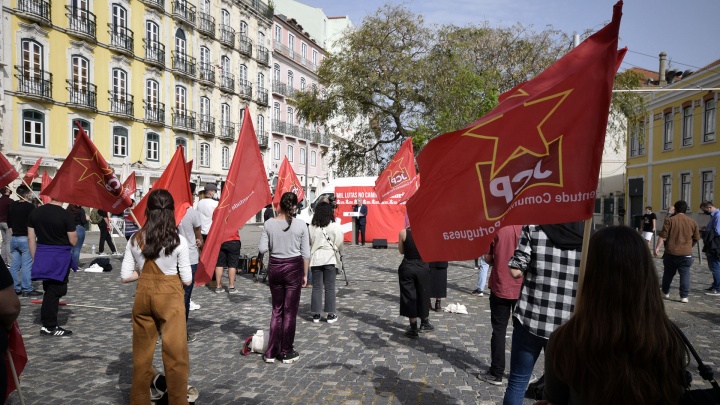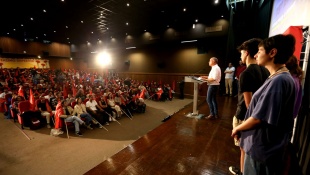Please receive a strong and warm greeting from the leadership of the PCP in this initiative of the Portuguese Communist Youth (JCP).
An embrace to each one of you, who is here, showing that, with all due care, it is possible to carry on our life in safety, extended as well to all Portuguese youth on this National Youth Day.
This is your day. And our, your Party, the Portuguese Communist Party, which has been the Party of the Youth since its founding a hundred years ago, is here to celebrate it with you.
It is the day of a population group, more than 1 million people, very diverse, with very different origins and paths, with very heterogeneous tastes, desires and interests, it is true. But still, a group, the youth, united by the characteristics of generosity, dedication, combativeness, and determination to change the world.
Values expressed with great conviction both on the National Student Day, which was celebrated on the 24th, and last Thursday at the National Demonstration of Young Workers, which brought hundreds of young people to the streets of Lisbon and Porto to defend their rights.
We celebrate National Youth Day under special circumstances. But we celebrate. Because it is necessary.
Exactly because it is necessary to respond to the multiple problems that you have already pointed out here today, which, justly, you want to get rid of, ensuring everyone’s right to be happy.
Much has been said about this generation. The most educated, the best prepared ever. But not less exploited or less subject to discrimination.
A generation faced with precariousness in work and life.
Precariousness that is materialised in labour contracts on day, hour, month, half time basis, false self-employed, and so many, so many other ways that allow capital to increase exploitation, but that mean instability in the life of everyone, inability to make lasting decisions, difficulty in implementing the projects to which everyone is entitled.
Precariousness added to the low wages of which young workers are the main victims, the theft of rights that must be resisted every day, the increasingly unregulated and more intense working hours.
Precariousness that prevents dreaming, starting a family, having children.
A generation confronted with attacks on the rights to Education, Culture, Healthcare, increasingly reduced to commodities in which capital invests and from which it seeks returns.
This is how we understand the high costs of education that should be free, are justified the barriers to access the highest levels of education, which include, during years as atypical as the ones we are experiencing, the insistence on the maintenance of tuition fees, which constitute one of the main hurdles to the continuation of studies, in the scarcity of school social action, with the very low public offer of accommodation for displaced students, the holding exams that deepen injustices.
This explains the difficulties in creating and enjoying culture, which is increasingly asserting itself as an essential good and not as a luxury or an extravagance and which, in these months, has been so missed by those who were locked down and isolated.
This explains the disinvestment that the National Health Service suffered over the years and that has now been laid bare in the difficulties that the NHS faced to guarantee equal access of all to the right to healthcare. But this divestment also translated into deterioration in the monitoring of the health of the youth, namely sexual and reproductive health and mental health.
A generation limited in its right to sport, whose support is increasingly limited.
A generation that still witnesses, in the second decade of the 21st century, the most disgusting discrimination due to the country of origin, the colour of the skin, the sexual orientation, the affirmation of the identity of each one.
But if young people identify well the injustices with which they are daily confronted, as we saw here a few moments ago, they don’t just stand still. They intervene and act to transform this reality.
They mobilise against tuition fees, for greater school social action, against national exams, for better conditions in Vocational Education. They organise and fight, in the Student Movement, for a free and quality Public School.
And they participate, with their class-oriented trade unions from CGTP-IN and Interjovem, for the right to work with rights, for better wages, for a general increase in wages and for a National Minimum Wage of 850 euros, against precariousness, for reducing the working hours to 35 hours.
And they stand up for the right to culture, and against racism and xenophobia and all discrimination, for a healthy and ecologically balanced environment, and in every locality, there we see them, in the struggles in defence of public transport and healthcare services and their concrete claims.
You all have PCP's firm solidarity and the commitment to always be by your side in the thousand struggles you have on the path of April.
This Party, which, at all times in its hundred years of history, has assumed this profound connection with the interests and aspirations of youth, is therefore, in truth, also the Party of the Youth.
The Party that in the Assembly of the Republic has been tireless in defending their rights. This has been the case in recent years, even though we have not been completely successful, due to the options of the PS and its government, almost always with the support and complicity of the PSD and CDS.
Despite the advances that have been achieved in Public Administration, not all steps have yet been taken in the fight against precariousness.
We managed to reduce the cost of tuition fees, even though we have not yet seen approved our proposal to abolish them.
Due to the workers' struggle and our intervention, the National Minimum Wage was raised, even though it did not reach 850 euros, as we proposed.
A giant step has been taken to reduce the cost of the intermodal transport pass, with strong impacts on the right to mobility and the defence of the environment, with free public transport yet to be materialised.
Progress has been made in expanding free passes to more children, and it is now necessary to guarantee the necessary response with a free public daycare network.
And why did we not go further?
Because the PS government's action, whether in recent years or in response to the epidemic, has been marked by submission to the diktats of the European Union, the Euro and the dictatorship of the deficit, by yielding to the manoeuvres and campaigns of economic groups and the agenda of PSD and CDS that seek, using the epidemic, to implement their reactionary projects of limitation of rights.
Today, the continuation of the epidemic raises the need for a response that requires a different mobilisation of means that continue to be denied.
To begin with, strengthening the means of prevention, screening, testing and vaccination, strengthening of the NHS, social support to those affected in their wages and income, but also the stability of economic activities and the survival of thousands of micro, small and medium-sized companies.
Which is incompatible with the government's attitude of counting pennies in social supports approved by the Assembly of the Republic, as it happened a few days ago, with the attempt to invoke the so-called “law of the brake” to prevent its implementation.
However much the government complains to the President of the Republic, we would like to remind that the “law of the brake” did not brake the epidemic and the government did not have the capacity to brake the abuses, and that it was one and both led so many Portuguese to the situation of needing these social supports, which the government now seeks to deny.
This situation is all the more glaring as it contrasts with the accumulation of profits by economic groups, at the same time that they address and prepare important public support for big capital’s deals and against national interests, such as: submission to the interests of Vinci in the construction of the new airport; TAP's restructuring plan and Groundforce's situation; the closings of the refinery in Matosinhos and the thermoelectric plant in Sines; the reprivatisation of EFACEC; the sale of six dams by EDP.
In the face of economic and social deterioration and the accumulation of problems in the country, the PCP has intervened over the course of months presenting solutions, many of which were defeated by the combination of votes between PS and PSD.
Proposals with emergency measures that, although only partially accepted, guaranteed, among other aspects: the payment of 100% wages in lay-off situations; the extension of unemployment benefits for another six months in 2021; the adoption of new social benefits; or the hiring, albeit insufficient and partly to be achieved, of thousands of workers for the NHS, for schools, security forces and other services.
Emergency measures that do not dispense, rather are part of a vision that places the necessary recovery of the country articulated with the fight against its structural vulnerabilities, which will not come, as it never did, neither from the impositions, nor from the criteria and guidelines of the EU, including from the so- called Plan of Recovery and Resilience that the government presents as the great solution.
The necessary response requires the mobilisation of all available resources - from the State Budget to EU funds or other forms of funding - subject to a sovereign development strategy, which rejects new straightjackets arising from the euro that are contrary to the country's development.
Yes, the answer that the country needs is not in this eternalisation of lockdown as a rule and in the trivialization of the State of Emergency, rather it requires an alternative approach that, limiting the framework of restrictions as much as possible, requires the articulation of epidemiological criteria with other health and social criteria.
What is being demanded today is the adequate preparation so that economic, social, cultural, sporting activities can be safely resumed, which are also essential to the life and health of the population.
The young people know it well. They need to live, to breathe, to participate in the present and to make projects for their future. Young communists have given enough proof that this is possible. With all the care that the situation demands, they have continued their activities, carried out their struggles, developed contact with other young people, and with them defending their interests and rights.
They did so to celebrate the Centenary of this Portuguese Communist Party and its project of Freedom, Democracy, Socialism, they will do so in April, to celebrate the Revolution whose values they adopted, they will do so in May in the great struggle of the workers and in their 12th. Congress on May 15 and 16.
To all of you, on this National Youth Day, we want to affirm our confidence in your energy, your strength, your joy, to ensure that the Future has a Party.




